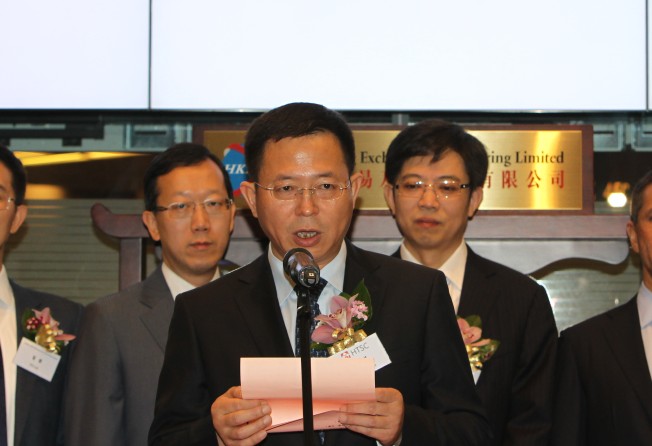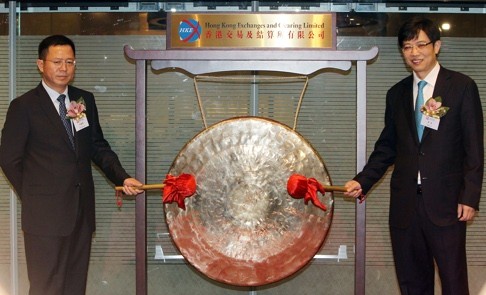Chinese firms raise most funds in Hong Kong since 2010
Challenges ahead now that mainland has lifted IPO ban and plans to launch a new board in Shanghai

Mainland Chinese and Hong Kong companies raised the most funds in the Hong Kong stock market this year since 2010, with the total up 35 per cent year on year, according to Thomson Reuters data.
Analysts say they expect mainland Chinese companies will continue to tap funds next year for their international expansion but also warn that Hong Kong faces competition from mainland stock markets after October’s lifting of a ban on new listings. On Wednesday, the mainland authorities also announced they had approved the launch of a new board in Shanghai.
Equity capital market fundraising in Hong Kong totalled US$90.4 billion this year, the most since 2010’s US$109.4 billion.
However, the fundraising was not evenly distributed throughout what proved to be a bumpy year.
Hong Kong’s total equity capital market fundraising in the fourth quarter – including initial public offerings, listed company share placements and other equity fundraising – reaped US$23.7 billion in proceeds, up 96.3 per cent on the third quarter but down 3 per cent year on year.
But the fourth-quarter result was dwarfed by the record US$42.43 billion raised in the second quarter thanks to a stock market rally on the mainland and in Hong Kong that ran from April to early June, sending benchmark indices to seven year highs.
Louis Tse Ming-kwong, director of VC Brokerages, said many companies had been unable to proceed with IPO plans in the third quarter due to the market rout that followed the rally. The Shanghai and Shenzhen markets shed 30 per cent of their value in three weeks from their mid-June peak, while the Hong Kong market was down 20 per cent during the quarter.
“The market rout in the summer time was so bad that it was hard to sell any new shares,” Tse said. “When the market regained stability in the fourth quarter, many companies rushed to push their IPOs.
“A further delay of their IPOs to next year could have cost them a fortune because they’d need to do their accounting reports again if they were outdated.”
The 39 IPOs in the fourth quarter raised a total of US$12.19 billion, three times the amount raised by the 23 IPOs in the third quarter and also more than the US$10.77 billion raised by 24 IPOs in the second quarter.
The second quarter, however, saw more raised by company share placements, at US$31.25 billion compared with US$8.85 billion in the third quarter and US$9.86 billion in the fourth quarter.
For the whole of this year, Hong Kong had 80 IPOs that raised US$32.56 billion, up 9.3 per cent year on year and the highest annual total since 2010 (US$57.5 billion).
Hong Kong regained the crown as the world’s top venue for IPOs this year with a worldwide market share of 16.4 per cent, beating the New York Stock Exchange which had 53 IPOs that raised US$19.66 billion – a market share of 9.9 per cent.
London ranked third at US$17.97 billion while Shanghai was fourth at US$17.1 billion.
Hong Kong last topped the IPO rankings from 2009 to 2011. It lost out to New York last year after mainland e-commerce giant Alibaba opted to list in the US in September of 2014, raising US$25 billion. The Hong Kong exchange refused to grant Alibaba an exemption that would have allowed it to list with a structure under which its founder Jack Ma Yun and certain key executives would have been able to nominate most of the board members despite holding only minority stakes.

Hong Kong’s IPO market was dominated this year by mainland Chinese companies, which accounted for 92.1 per cent of all funds raised. The rest was raised by Hong Kong-based firms.
“This was due to China having a four-month suspension of IPOs from July to October during the market rout,” Tse said. “The many Chinese companies which could not have IPOs on the mainland market during the suspension period shifted to Hong Kong.
“Hong Kong has to prepare to compete with the Shanghai and Shenzhen stock markets next year as the mainland has lifted the IPO suspension. In addition, it will introduce a new registration-based IPO system next year which will make it easier for mainland firms to have IPOs in the mainland markets.”
There are however, still some big mainland Chinese IPOs coming up next year in Hong Kong, including the mega IPO of Postal Savings Bank of China and other financial floats from China Merchant Securities, Everbright Securities, Orient Securities and Taikang Life.
Financial firms accounted for 60 per cent of the funds raised in Hong Kong IPOs this year,
with mainland Chinese brokerage firm Huatai Securities’ second-quarter IPO the biggest, raising US$5.0 billion.
The top two listings in the fourth quarter were also mainland Chinese financial firms. China Huarong Asset Management raised US$2.5 billion in proceeds while China Reinsurance (Group) generated US$2.0 billion.
Morgan Stanley currently leads this year’s rankings for Hong Kong-listed stock market fund raising underwriting, capturing a market share of 9.5 per cent with US$8.6 billion in related proceeds.
In the bond market, Hong Kong dollar-denominated bonds raised a total of HK$94.0 billion this year, up 4.3 per cent year on year and the most since 2012.
Dim sum bonds raised just 19.8 billion yuan in the fourth quarter, down 8 per cent from the third quarter and the lowest quarter since the first quarter of 2011 at 17.6 billion yuan.